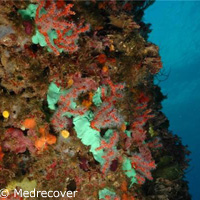Corals under poaching pressure
Researchers led by the University of Barcelona in Spain have discovered that poaching is responsible for the near 60% loss of red coral biomass in the Medes Islands marine reserve. Published in the journal Conservation Biology, the study's findings highlight the impact poaching has on the marine reserve, and shed new light on the effect recreational diving has on the coral population of the Medes Islands. The team says the reserve effect in the Medes area has given the conservation of various marine species in their natural environment a boost. The red coral, Corallium rubrum, which makes the Mediterranean its home, is harvested both legally and illegally along the Catalan coastline. So poaching is the biggest threat against the colonies of this marine invertebrate. The researchers point out that red coral was a hot commodity for the Greeks and Romans in ancient times, used especially in jewellery design. But using coral for such commercial purposes still continues to this day. 'Coral is a very fragile and vulnerable organism, with an extremely slow growth rate of 0.3 mm to 0.5 mm of basal diameter per year,' says Cristina Linares from the Department of Ecology at the University of Barcelona, the lead author of the paper. 'In the western Mediterranean Basin, with the exception of some French marine reserves, most red coral colonies are in a very similar situation, exhibiting very small stems.' The researchers conducted the study in the period from 1992 to 2005. They kept an eye on the basal diameter and density of Corallium populations both inside and outside the marine reserve. They compared their findings with the data for marine protected areas in France, areas that specifically prohibited fishing and diving activities. The findings reveal that red coral colonies in the Medes area have shrunk in size; their numbers are smaller and below the levels observed in protected areas in France. According to the researchers, the species is more abundant in the marine reserve compared to the outlying areas. 'The impact of poaching causes irretrievable losses in populations of Corallium rubrum,' says Dr Linares, 'which is why new guidelines on protection from fishing and diving should be considered to preserve the populations.' Commenting on the study, co-author Bernat Hereu, also from the University of Barcelona, says: 'On the Catalan coast, coral is found at lesser depths than in other areas of the Mediterranean. This is financially beneficial to the tourist sector but also means that poachers can reach colonies with little difficulty.' Besides the applied research, the team has been working with the Montgrí, Medes Islands and Baix Ter natural parks to reverse the effects of poaching on Corallium colonies. Following through on this will result in novel legal products for confiscating coral from poachers and replanting it on the sea floor. 'This is a stop-gap measure that will never be a definitive solution to the coral problem,' Dr Linares says. 'It is a way of recovering part of the coral that is still alive, replanting it on the rocky substrate and creating a natural community that is integrated into the marine ecosystem.' The reintegration of colonies lost because of poaching practices is no easy task; the researchers have the important task of constantly monitoring the colonies to determine whether they will secure viable populations once again. Researchers from France and the United States contributed to this study.For more information, please visit: University of Barcelona:http://www.ub.edu/web/ub/en/Conservation Biology:http://www.wiley.com/bw/journal.asp?ref=0888-8892
Countries
Spain, France, United States



